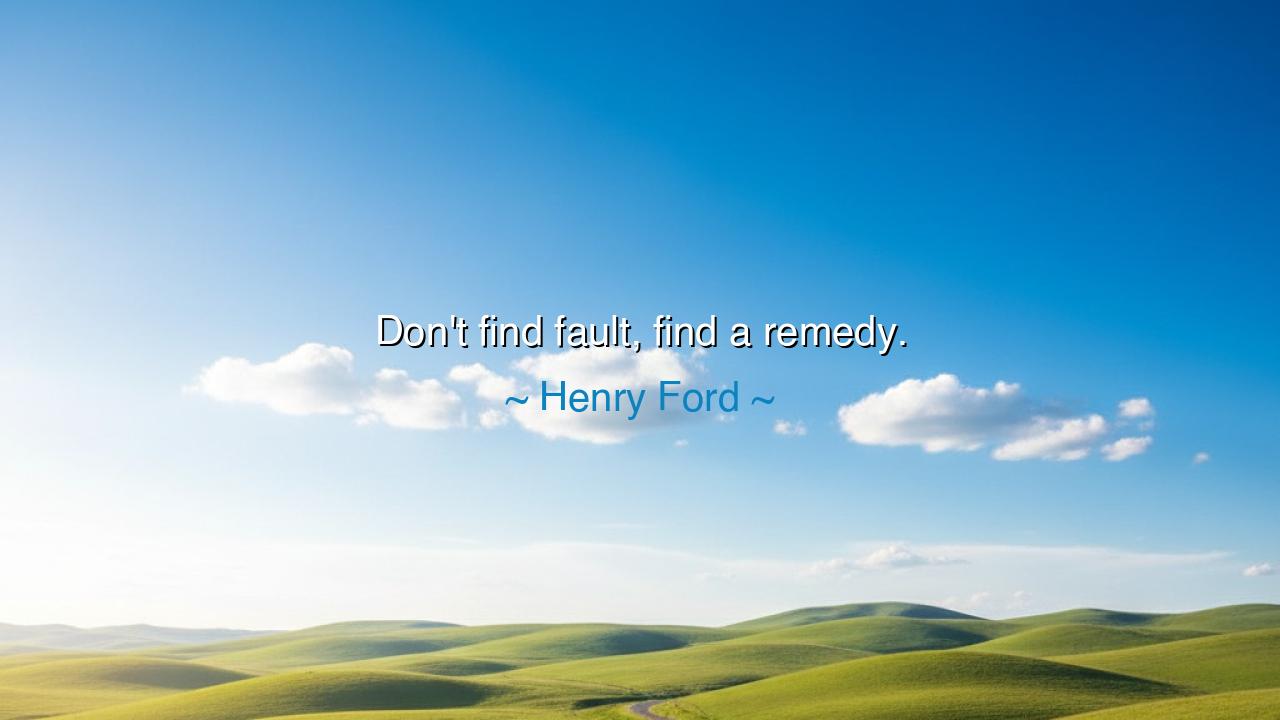
Don't find fault, find a remedy.






The words of Henry Ford, “Don’t find fault, find a remedy,” shine like a torch through the corridors of time, guiding all who labor, all who strive, all who seek to build. In these few words lies an eternal teaching: that it is easy to cast blame, to point the finger, to dwell upon what is broken—but true greatness comes from the spirit that rises above complaint and bends its will toward healing, invention, and solution. Fault-finding is the pastime of the idle, but remedy-making is the art of creators, leaders, and visionaries.
This wisdom did not spring from idle theory. Henry Ford himself was a man who faced the harsh trials of labor and enterprise. When the machines broke, when the workers erred, when the markets resisted, he did not waste his strength upon anger or condemnation. Instead, he asked: “What is the remedy? How may this be made whole? How may we move forward?” It was this spirit that gave birth to the assembly line, to affordable automobiles, and to a revolution in industry. He saw not only faults but also pathways through them, and in so doing, he carried humanity across the threshold into a new age.
The ancients themselves knew this truth. The Stoics taught that to rage against misfortune was to rage against the universe itself. Marcus Aurelius, emperor and philosopher, once wrote: “Do not be overheated with what is beyond your control. Instead, turn your mind to what can be done.” This is Ford’s teaching in another tongue: seek remedy, not fault. The world bows not to complainers but to problem-solvers, for their actions change the course of nations.
Consider the story of Jonas Salk, who faced the terror of polio, a disease that crippled countless children. Many voices cried fault—blaming governments, blaming medicine, blaming fate itself. But Salk gave his heart to the remedy. With sleepless nights, with relentless trials, he forged the vaccine that banished fear from a generation. He did not waste his days lamenting the cruelty of disease; he poured them instead into conquering it. Thus, he became not only a healer of bodies but also a builder of hope.
Fault-finding binds the soul in chains, for it keeps the eye fixed upon what is wrong. Remedy-seeking frees the spirit, for it directs thought and labor toward what might yet be right. This is why Ford’s teaching is not merely industrial but universal. In our homes, in our friendships, in our very hearts, we may choose the path of the fault-finder, who complains of weakness and injustice—or the path of the remedy-maker, who works to mend, to uplift, to transform.
The lesson is simple, yet it requires courage: turn from blame, and turn toward responsibility. If a tool is broken, do not curse it—repair it. If a friend falters, do not condemn—help restore. If your own life lies in ruins, do not wallow in despair—seek the remedy with steadfast heart. In every failure lies a seed of solution, waiting for the hands of the faithful to draw it forth.
What, then, must we do? First, train the mind to pause when faults arise, and ask: “What is the remedy?” Second, act swiftly, lest the poison of blame fester into bitterness. Third, teach others by your example, showing that solutions are nobler than accusations. In this way, each of us becomes an architect of healing rather than a scribe of complaints.
Therefore, O seeker, carry these words with you as a shield against despair and a sword against idleness: Don’t find fault, find a remedy. Let your life be marked not by the tallying of wrongs, but by the remedies you leave behind. For it is the builders, not the blamers, whose names endure upon the scrolls of history.






AAdministratorAdministrator
Welcome, honored guests. Please leave a comment, we will respond soon